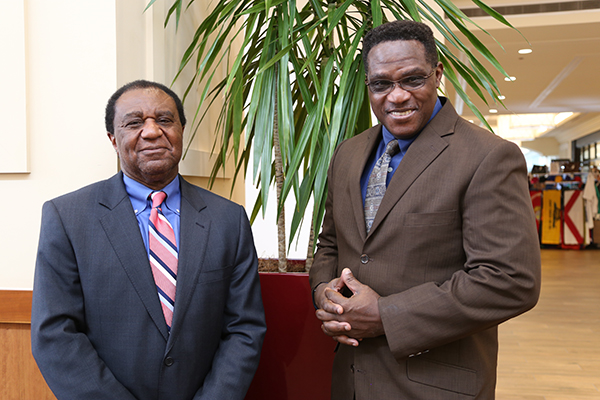By Grace Thornton
The Alabama Baptist
James Harris knows what it’s like to eat a meal and not be full at the end of it.
He had four siblings and money was tight. Then after his mom died when he was 11 they moved in with family and there were even more mouths to feed.
“We know what it’s like to grow up in an environment where you eat what’s in front of you and if it fills you, fine, and if not you have to wait until the next meal,” he said.
So to say Harris has empathy for the hungry is an understatement. That’s why he has a heart for Alabama, a state where many people struggle to put food on the table.
“There are a lot of food deserts in Alabama,” he said. “We want to change that.”
Community access
Food deserts are low-income communities without ready access to healthy and affordable food — for instance, urban areas without supermarkets in reasonable walking distance or rural areas without a store nearby.
Harris is hoping Harvest Community Charities will be an oasis in those deserts.
The Birmingham-based ministry focuses on food, but it does a different kind of work than food pantries, Harris said. It doesn’t work with donated food — it seeks to build up ways for a community to access and afford healthy, nutritious food directly from grocery suppliers.
One of those programs uses church-based pantries as a way to sell supermarket-quality food to the community at heavily discounted prices. Harris achieves this by working with grocery wholesalers to buy food and ship it straight to the churches’ pantries.
Long-term program
Another program called the Power of U mobilizes church members to patronize a grocery store in their area in order to keep it thriving and open for the community to buy food in the years to come. The store then gives back a small percentage of its promotional dollars to Harvest Community Charities to support its programs, and the ministry turns right around and uses those funds to buy fresh food from the store to use in local pantries.
It’s a cycle that helps everyone, Harris said. “What we do is not a giveaway; it’s a long-term, sustainable program to get good quality food into a community.”
And Harris knows his stuff.
Because of his family’s need for food when he was growing up, he started working at a Safeway supermarket as a teen and worked his way up through the ranks. By 22 he owned his own grocery store. And over the past four decades he’s learned the ins and outs of the corporate food business at the executive level.
He’s putting that to use now in his work with Harvest Community Charities.
And he and ministry partner Sammy Campbell — formerly a church planting specialist for Birmingham Metro Baptist Association — both agree the end goal is an eternal one.
“We’re trying to eliminate food deserts in the state, reduce food hardships and see folks saved,” Campbell said. “We want to bring them in, feed them, organize them into churches and establish relationships that make all the difference.”
In Alabama nearly 17 percent of the total population is food insecure with the rates in some counties as high as 32 percent, according to Feeding America.
Harris said at the end of the day, it’s about meeting people at their place of need, both with accessible food and the love of Christ and even with help finding a job so they can better afford food in the future.
As one of the ministry’s many ways of helping a community get on its feet, Harris wants to help train up people to earn careers in the grocery business just like he did.
“I was one of those people in the system — I know what it’s like,” he said. “We want to offer them an off-ramp from the system.”
Kristy Kennedy, an associate in the associational missions office of the Alabama Baptist State Board of Missions, said she loves the way the ministry’s main objective is the life transformation that comes from meeting Christ.
“They seek to meet the hunger needs of fellow Alabamians while sharing the hope that Christ gives,” said Kennedy, who also serves as a board member for Harvest Community Charities. “They are a true group of visionaries who seek to provide nutritious food to help people be able to live the abundant life that Christ provides.”
The ministry is also hoping to partner with more and more churches who could adopt an area of their city or state with food access problems.
‘Great opportunity’
Harris has a variety of creative ideas of how they could help, from financial support to community farming to food distribution.
“I so want the churches to step into this great opportunity that would entice people to come to know Him. The most important thing is for people to come into relationship with Christ,” Harris said. “What if God does something in Alabama that could become a template for use around the nation? I think we have an opportunity to do that.”
For more information visit hccharities.com.






Share with others: